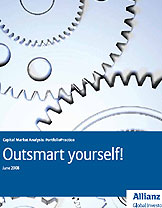Investing successfully in the capital market is no easy matter. "This isn’t just because of the complexity of the subject and the ups and downs of the markets. Sometimes investors just get in their own way", is how Hans-Jörg Naumer, head of Capital Market Analysis at Allianz Global Investors, puts it. "Our hearts and our brains interact, which is why we frequently make investment decisions that aren’t rational".
It is also on account of these typical behavioral patterns that the markets are not completely efficient. As professional investment managers can make good use of these inefficiencies, it is all the more important to get to the bottom of such behavior-oriented investment decisions.
Panic and greed have no place in an investment plan

Between panic and greed
One of the most common reasons why misguided investment decisions are made is that investors often obtain and process simplified or fragmented information. This is compounded by an over-estimation of one’s own capabilities coupled with a thirst for reward and recognition as well as a desire to avoid making a loss.
In many cases taking the purchase price – and not the prospect of future gains – as the point of reference is to blame for investors not getting out of loss-making positions. "All of this together contributes to an inefficient and sometimes backward-looking investment behavior that misjudges risk and opportunity and leads to sub-optimal results" is Naumer’s conclusion.
"Outsmart yourself"
Investors should recognize and overcome their own weaknesses. In their latest publication in the "PortfolioPractice" series, under the heading "Outsmart yourself" the capital-market analysts of Allianz Global Investors provide a useful advice on how to achieve this: the publication contains for example a checklist with recommendations of what to consider before making a decision:
- draw up long-term rules – if you have determined what your risk profile is, you get continuity in the ratio of equities to bonds in your portfolio mix and don’t have to keep your eyes glued to the ticker all the time. If you have decided what special investment categories (emerging states, new energy sources, commodities) you want to add and what doesn’t fit into your scheme of things, you reduce the complexity of your investment decisions and have a clearer overview.
- your fundamental analysis should always look ahead to expected future income and not back at past successes.
- when you acquire information, make a point of seeking out items that contradict your own opinion. Friends and acquaintances can also play the "devil’s advocate", which will protect you from both over-estimation of your abilities as well as from the urge to prove yourself.
- this includes "don’t touch hot tips from self-appointed experts, but do your own research and seek out different paths", is Naumer’s advice to investors.
Rules on correct saving
In the opinion of capital-market expert Naumer a rational approach to the investment of money almost automatically leads to the subject of correct saving. Investors with a long-term investment horizon can benefit more from the higher return opportunities of more volatile investment instruments such as equities. Long-term and disciplined saving pays off more than proportionately thanks to the compound-interest effect.
Save a fixed amount regularly in securities and you won’t have to waste any thought on timing and, thanks to the average-cost effect, you save anti-cyclically and thus on average at less expense, for when stock prices are down the investor gets more shares for a given amount, when prices are up, he or she gets fewer shares.
Need for investment in all-round financial education
The conclusion is that in order to even contemplate investing and equities, etc., in the first place, we need a solid grounding in financial matters. "A good basic understanding helps you to grasp the intricacies of the situation better. This would include knowing how the compound-interest effect works, or what the relationship between yield and risk is", says Thomas Wiesemann, CEO of Allianz Global Investors Deutschland.
He calls upon everyone "to invest in their all-round financial education so that they can handle money and private provision appropriately and with a specific goal in mind". This is a pre-requisite for securing oneself competently, confidently and perceptively against one’s personal life risks, building up one’s assets and thereby leading one’s life self-reliantly.
As with all content published on this site, these statements are subject to our Forward-Looking Statement disclaimer, provided on the right.